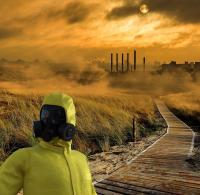
by Tim Ward, author of Zombies on Kilimanjaro: A Father-Son Journey above the Clouds (Changemakers, 2012). Originally published in Huffington Post Travel. There is that moment when the indigo sky pales and the stars slowly vanish, yet the sun is still hidden. What time is it? You can't guess. You are near the top of an all night hike - one way, uphill - to the roof of Africa. The air is winter cold, though it's July and you are standing near the equator. Your lips feel rough and numb, like they have freezer burn. For the past five hours you have thought about turning back. You might have feared you would fall asleep and wake up half frozen. Or tripped on your leaden feet and tumbled into the darkness, a human avalanche. You wiggle your toes and you don't feel a thing. You beat your hands together, move your fingers inside your gloves as if playing piano, not hoping for sensation, but just to keep them in motion. Somehow you persevere, putting one foot in front of other, encouraged by your Tanzanian guides, whose good humor on the trek is mostly welcome, but dang, they make it seem so easy. "Po-le, po-le, slowly slowly:" they urge you in Swahili not to push too hard. As if anything about this was easy. And yes, "Hakuna matata," they say with a lilt in their voices, "No worries!" Now here you are, cresting the rim of the volcano. It's light enough you can see your breath, like a ghost escaping from your mouth. You pause for a second, rasp for air, and feel your heart pounding. Not just in your chest. You feel it in your throat. You've been breathing hard, as if you've been sprinting all night long. Your lungs need to work like a pair of bellows, forcing thin air through them as fast as they can expand and contract to catch what little oxygen there is in the air. Those small packets of chemical hand warmers you had packed all this way for this night - are you wondering why they stopped working? Their magic comes from a chemical reaction requiring oxygen, and it's scarce in the air at almost 20,000 feet above sea level. You hit the lip of the volcano, and a few steps over, the lip drops steep into the crater, miles across, with a sea of ash inside. You have made it to the top. At that instant, the sun rips across the horizon, unlike any other sunrise you have ever seen. You realize it's a star, a burning, orange ball that could blind you if you looked straight on. Its light transforms the faces of your companions to brass. When you gaze around you see summit glaciers for the first time, turned weirdly yellow by the sun, like massive slabs of prehistoric butter. Beyond, all Africa spreads below you to the horizon. You have made it. You are at the top of Kilimanjaro. Exhilaration overwhelms you. You feel a tear - elation, exhaustion, you don't know why. The droplet freezes on your face. You force your brain to think, to pull together the flashing sensations, stinging cold, your bucking breath. You feel alive like never before and you never want to let this moment go. Life whirls around you and in you and through you, and you only want to rest inside that great vortex. Life means more because you made it here. It seems impossible that you did this on your own legs. Yet here you stand, limbs shaking. And if you could do this one impossible thing, then whatever else there may be for you in the world below, at that one moment you know that anything is possible for you. Tim Ward is the author of Zombies on Kilimanjaro: A Father-Son Journey above the Clouds.
Categories:
0 comments on this article







